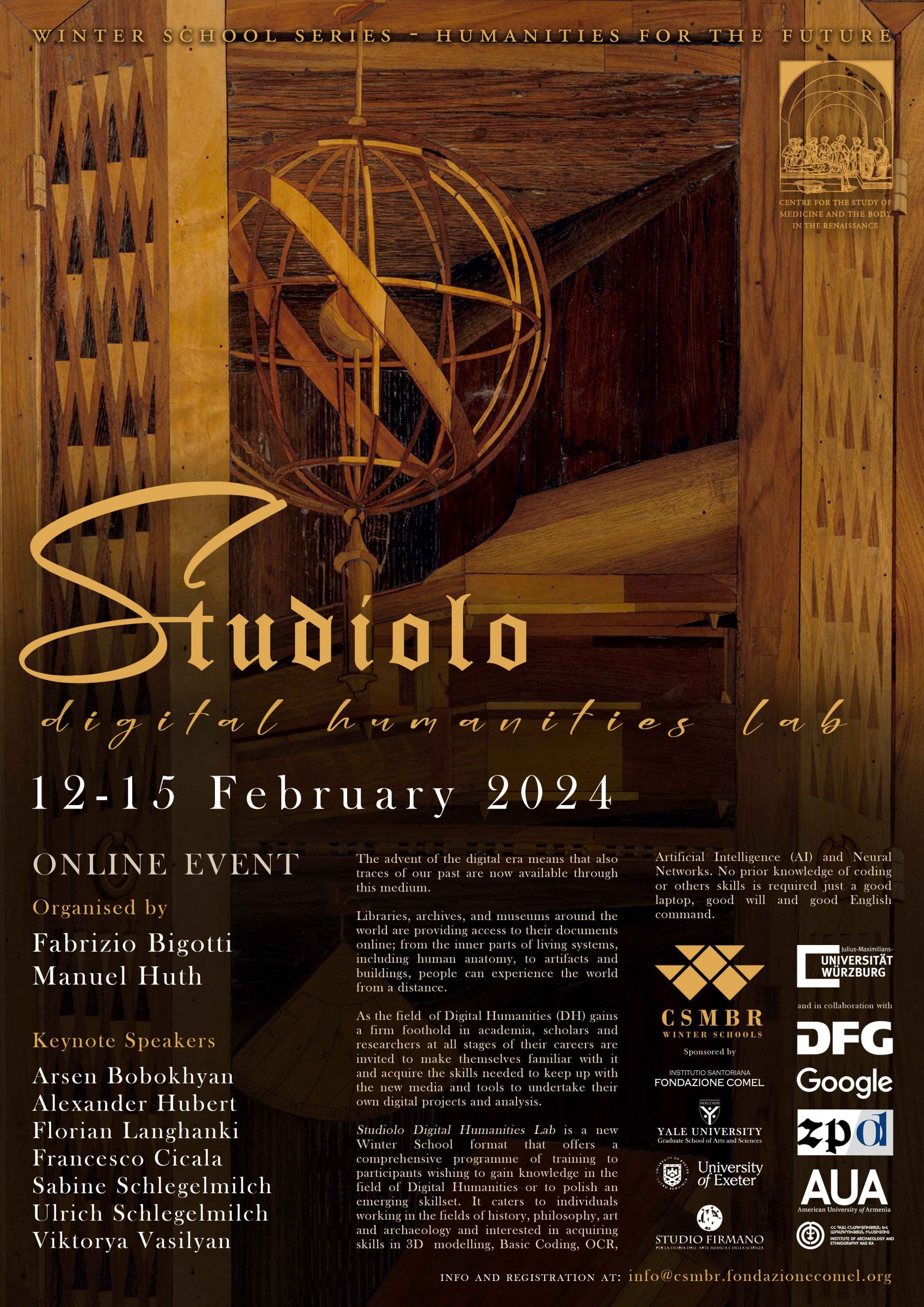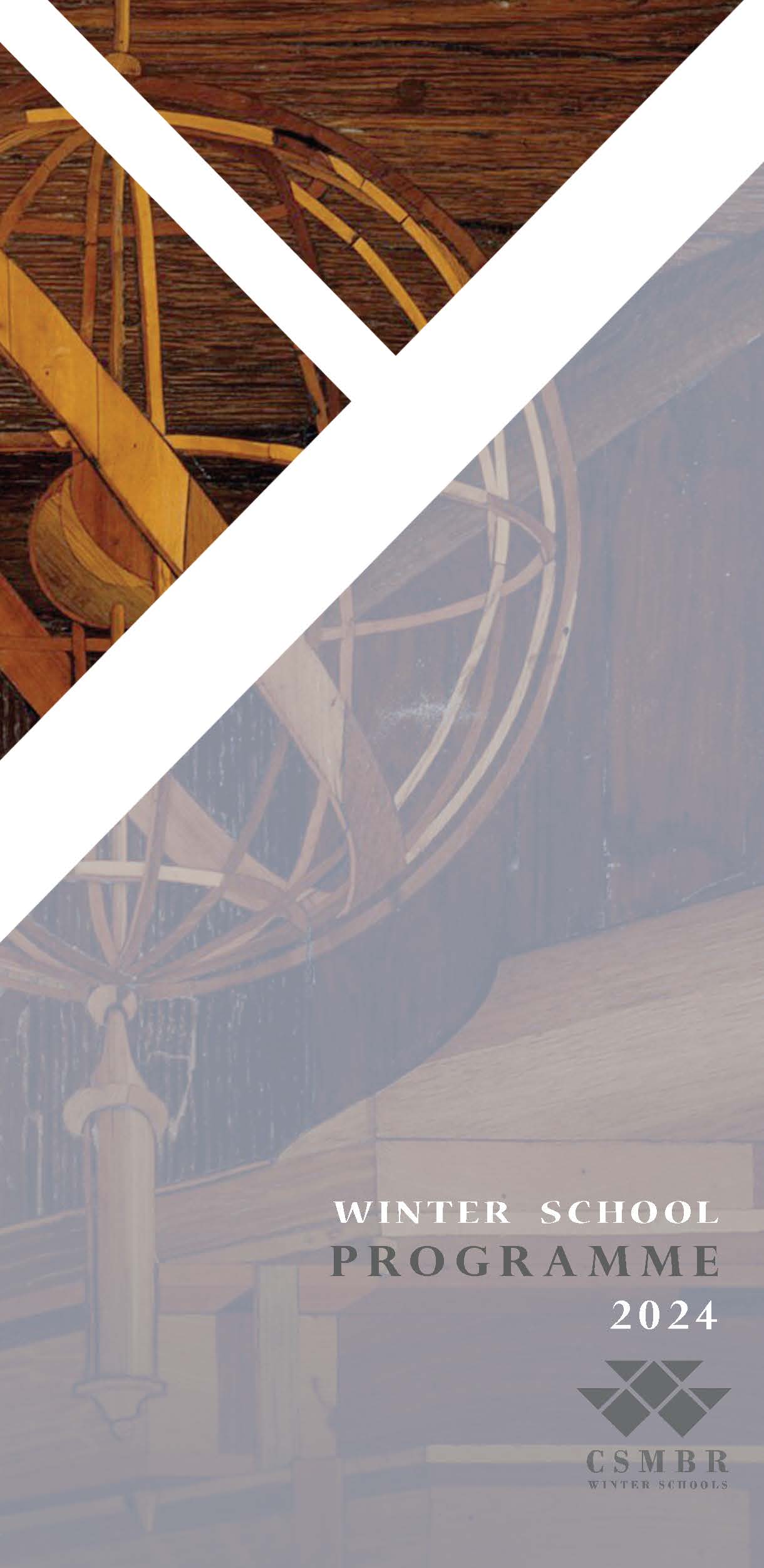Studiolo 2024


CSMBR Winter Schools: Humanities for the Future
Studiolo
Digital Humanities Lab
12-15 February 2024
Organised by
Fabrizio Bigotti
Manuel Huth
Keynote Speakers
Arsen Bobokhyan
Francesco Cicala
Norbert Fischer
Alexander Hubert
Florian Langhanki
Sabine Schlegelmilch
Ulrich Schlegelmilch
Viktorya Vasilyan

Click to download the poster
Winter School Themes
![]()
Python Programming
![]()
3D Modelling
![]()
From Documents to Data
![]()
Natural Language Processing (NLP)
![]()
Working with Databases
![]()
Segmentation Programmes
![]()
Foundational Concepts of Deep Learning
Workshops
![]()
Basics and Applications of OCR (F. Langhanki)
![]()
Artificial Intelligence for Project Writing (F. Bigotti)
![]()
Applications of Virtual Reality (V. Vasilyan)
Programme
Click to Download the Programme
Abstracts
Abstracts and speakers’ biographical outlines can be downloaded here.
Sponsorship
Event held as part of the project Measuring the World by Degrees. Intensity in Early Modern Medicine and Natural Philosophy 1400-1650 (461231785) sponsored by the German Research Foundation (DFG)
The advent of the digital age means that our past is now accessible through a medium that transcends time. While libraries, archives and museums are providing online access to the treasures of history that were once jealously guarded and are now at our fingertips, academia is facing a revolution both in the way scholars access knowledge, and also in the way they circulate, and disseminate it.
As knowledge defies physical boundaries and the Humanities go Digital, students, scholars, and academics are all invited to familiarise themselves with the new media in order to acquire the skills needed to keep up with the progress in their field.
Humanities for the Future
The possibilities opened up by digital humanities are vast, and worth considering for anyone writing a new project, seeking funding or simply new means of implementing existing ideas.
Proficiency in Digital Humanities does not merely broaden one’s skillset; it fundamentally reshapes research, endowing it with greater depth and impact. Consider the capacity to unveil concealed patterns within historical datasets through sophisticated data analysis or the ability to reconstruct archaeological artifacts in three dimensions, yielding profound insights. These competencies not only elevate scholarly work but also facilitate the exploration of new avenues for funding and collaborative research.
Studiolo: A New Way to Think
Studiolo Digital Humanities Lab is a new Winter School format designed to meet the needs of those who, both inside and outside of academia, are faced with the digital revolution and want to make the most of it.
Its interdisciplinary format allows participants to get a feel for the potential of new media, while acquiring basic coding skills, knowledge of 3D modelling, Optical Character Recognition (OCR) and key concepts in Artificial Intelligence (AI) and Large Language Models (LLM), as well as tools for communicating with experts in the field.
A Comprehensive Programme
The programme, spanning four days, will allow participants to interact with leading academics who have or are currently working as PI in important digital humanities projects in the history of art, medicine, science, philosophy, as well as philology and archaeology. It is designed to offer a comprehensive skillset at the end of which participants will be familiar with the main features of the field and will have the tools to shape their own projects.
Beyond frontal lectures, participants will have the opportunity to connect with a network of international scholars in a variety of fields, including both emerging and established figures.
Emphasising the acquisition of practical skills, the Winter School requires no prior knowledge of coding or other skills. It caters to individuals from different backgrounds and career stages. Participants will be provided training by means of frontal lectures, Q&As, workshops and a series of exercises in breakout sessions.
- Basic coding skills in Python;
- An overview of the opportunities offered by data analysis;
- Database building;
- The potential of 3D Modelling in art and archaeology;
- An introduction to Machine Learning and Neural Networks;
- Insights into using AI to refine academic project writing;
- Knowledge of contemporary OCR systems, and training in how to use segmentation and text recognition;
- Analysis of case studies of some of the state-of-the-art projects in the field;
- Workshops focused on participants’ specific projects and needs.
By the end of the Winter School, participants will;
- Understand how to embed different digital media into humanistic research;
- Know the key terms of Digital Humanities and coding terminology;
- Familiarise themselves with the uses and applications of Artificial Intelligence;
- Be able to employ basic coding for data analysis and visualisation;
- Understand the applications of segmentation programmes;
- Get personalised feedback on their project ideas.
Organisation
The Winter School will be conducted online over four days, from 10.00am to 4.00pm (CET) daily. Each day will be divided into two sessions, the morning session (10am-1pm) and the afternoon session (2-4pm). The two sessions will alternately focus on developing coding skills and discussing current digital projects from a variety of disciplines. Group exercises in breakout sessions are also envisaged to implement the coding skills learned during the Winter School.
Participants are strongly invited to prepare their own presentation, best if based on current or future projects so as to interact with speakers proactively and get feedback and suggestions on how to further develop current proposals.
There may be slight changes to the working schedule and number of lectures, but these will not impact the overall programme.
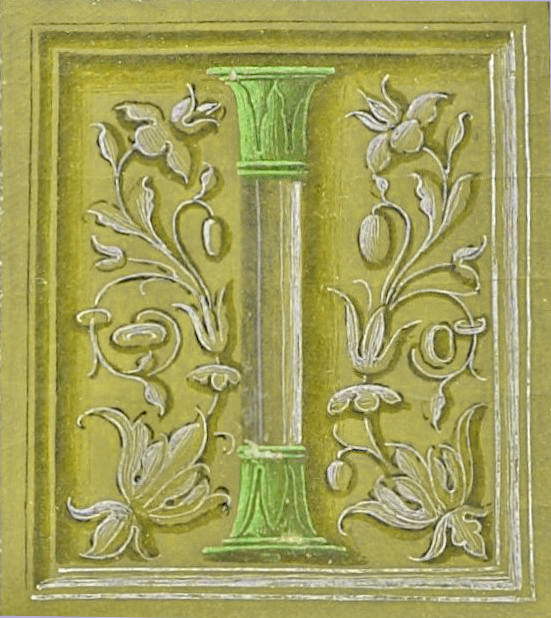
Dates: 12-15 February 2024
Format: Online
Early Bird Deadline: 12 December 2023
Regular Deadline: 31 January 2024
Grant Deadline: 15 November 2023
Queries
Registration Fees
Early Bird Registration
€ 180
Regular Registration
€ 250
Check Out
Credits
We are grateful to Dr. Georgiana Hedesan for proposing the theme of the Winter School and for her help in drawing up the initial outlines of its organisation.
Scientific Direction:
Fabrizio Bigotti
General Coordination:
Tomaso M. Pedrotti Dell’Acqua
Andreas Hylla
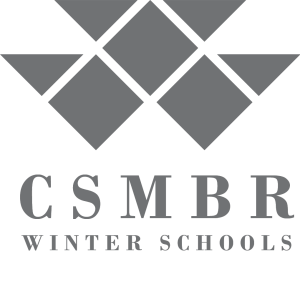
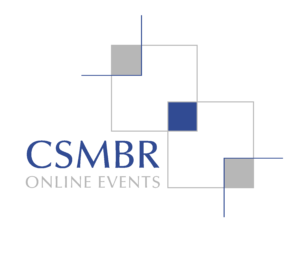
In collaboration with
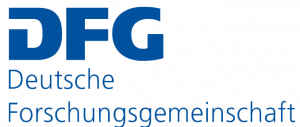

![]()





